What are analytical skills? Analytical skills are needed when you want to be able to work more independently, make informed decisions, or be better at problem-solving.
It is a set of skills that includes analytical thinking, according to the World Economic Forum, on the top of the most in-demand job skills for the future.
You've heard about analytical skills before, but are unsure how well you are applying these skills in study, work, and life.
Well, we've got your cover! This article explains in more detail what analytical skills are, their examples, and tips to improve. So, let's get over it!
Table of Contents
- What are Analytical Skills?
- What are Examples of Analytical Skills?
- What are the Benefits of Analytical Skills?
- How to Improve Your Analytical Skills
- Key Takeaways
- Frequently Asked Questions
What are Analytical Skills?
Analytical skills refer to the cognitive abilities that allow you to gather information, do research, interpret data, and draw conclusions in order to make decisions, whether it is in a professional or personal context.
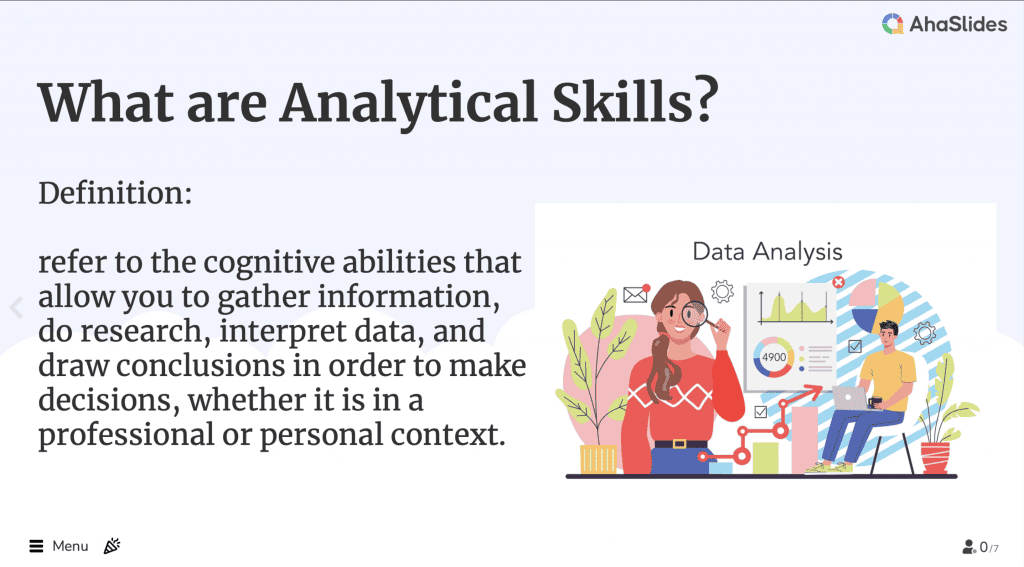
What are Analytical skills vs. Analytical thinking?
Analytical thinking is a more general term than analytical skills, which describes the ability to think critically and rationally about information. This can involve identifying assumptions, biases, and logical fallacies. Analytical thinkers are able to evaluate information and arguments and form their own opinions based on evidence.
What are Analytical skills vs. Interpersonal skills?
Analytical skills and interpersonal skills are often seen as being in opposition to each other, though they share the same communication skills. Interpersonal skills mean a person can interact effectively with others. This can involve communicating clearly, listening attentively, and building relationships. Interpersonal skills are important for teamwork, collaboration, and conflict resolution.
More Tips from AhaSlides

Looking for a tool to engage your team?
Gather your team members by a fun quiz on AhaSlides. Sign up to take free quiz from AhaSlides template library!
🚀 Grab Free Quiz☁️
What are Examples of Analytical Skills?
What are analytical skills that you should pay attention to?
Analytical skills include a wide-ranging set of professional qualities. Each quality comes with certain strengths and benefits that contribute to your ability to analyze information, solve problems, and make informed decisions in a variety of contexts.
Here are the 6 most important analytical skills to master: Critical Thinking, Communication, Data Analysis, Logical reasoning, and Creative thinking.
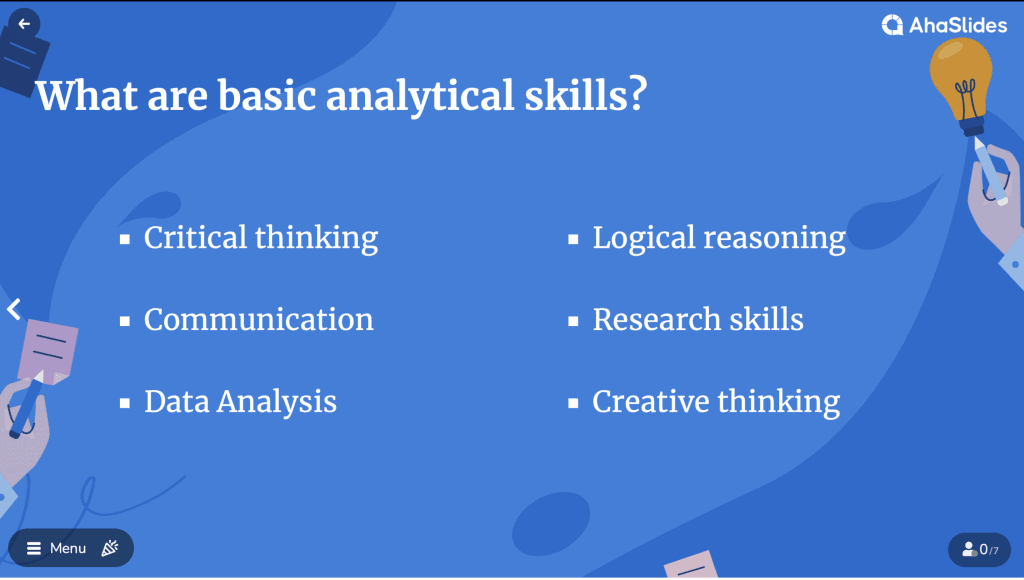
Critical thinking
Individuals with critical thinking are able to think clearly and rationally about information. This cognitive skill also involves being able to identify assumptions, biases, and logical fallacies.
- For example, a critical thinker usually starts with "why" questions and focuses on understanding the root causes of an issue rather than making hasty conclusions.
Communication
Communication is the ability to express oneself clearly and effectively. Good communication includes listening carefully, to ask questions, and to explain one's ideas in a way that others can understand.
- For example, a good leader with communication knows what to say to inspire, motivate, and guide their team. Organize a 1-to-1 conversation to give feedback to employees rather than criticize them in public.
You might also like: Best Tips For Effective Communication In The Workplace in 2023
Data Analysis
The capability to collect, organize, and interpret data is called data analysis. A person with data analysis skills can easily identify patterns and trends, and draw conclusions from data.
- For example, before conducting a marketing campaign, a marketer starts by collecting data on user interactions with your website, including page views, click-through rates, and the time spent on each page.
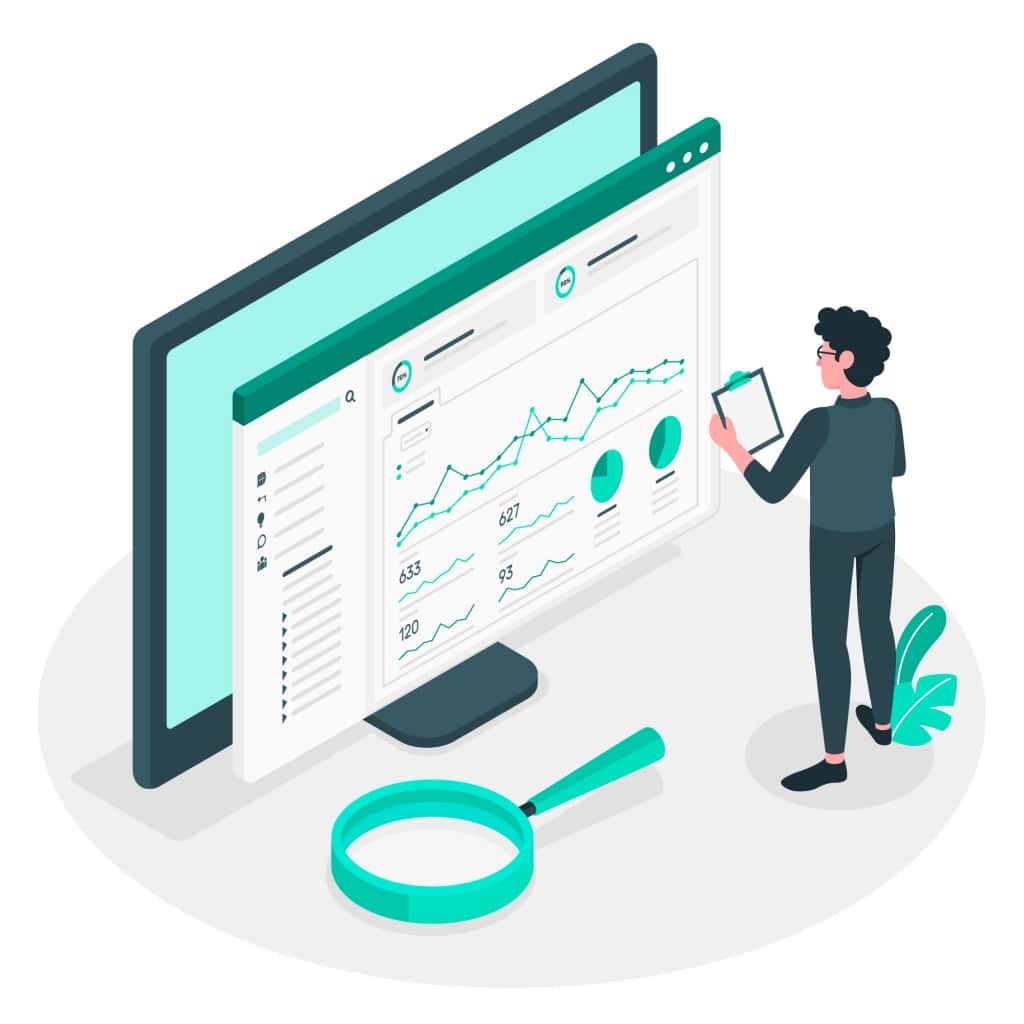
Logical reasoning
Logical reasoning indicates someone can think logically and construct sound arguments. It demonstrates the ability to identify the premises and conclusions of an argument and to assess whether the premises support the conclusion.
- For example: Imagine you are a consumer looking to purchase a new smartphone. There are several factors to consider before making the final purchase such as price, features, brand reputation, and user reviews.
Research skills
Research skills are the ability to find, evaluate, and use information. Good researchers are able to identify reliable sources of information, evaluate the credibility of information, and summarize information in a clear and concise way.
- For example: A researcher with the ability to conduct a comprehensive literature review in a limited time along with reading skills. It is also about proficiency in using software to analyze the data efficiently.
You might also like: How to Write Objectives | A Step-to-step Guide (2025)
Creative thinking
Not less important than other analytical skills, creative thinking helps a person come up with new and original ideas. It involves being able to see things from different perspectives and to think outside the box.
- For example, A creative like-minded person thinks out of the box and doesn't let themself be locked in their existing beliefs or assumptions. Everything that happens around them can be a valuable source of inspiration.
What are the Benefits of Analytical Skills?
“Work smarter, not harder.”
- Analytical skills are needed for every employee to improve job performance by working smarter, not harder.
First of all, employees with good analytical skills know how to use tools to support their work. By employing data analysis, employees can prioritize tasks based on their impact, focus on high-value activities, and avoid wasting time on less productive efforts.
These skills also enable employees to adapt to changing situations quickly. When faced with new challenges or unexpected obstacles, they can gather and analyze relevant data to devise effective solutions.
- Having analytical skills in your CV will increase the chance of landing a dream job or dealing with a higher salary.
Analytical skills are highly sought after by employers across industries. What are analytical skills to mention in CV? A survey by the National Association of Colleges and Employers found that 77% of employers said that critical thinking and problem-solving skills were essential for new hires.
The Bureau of Labor Statistics projects that "jobs in data science and analytics will grow by 22% from 2020 to 2030", much faster than the average for all occupations. The BLS also projects that the median annual wage for data scientists will be $126,830 in 2029.
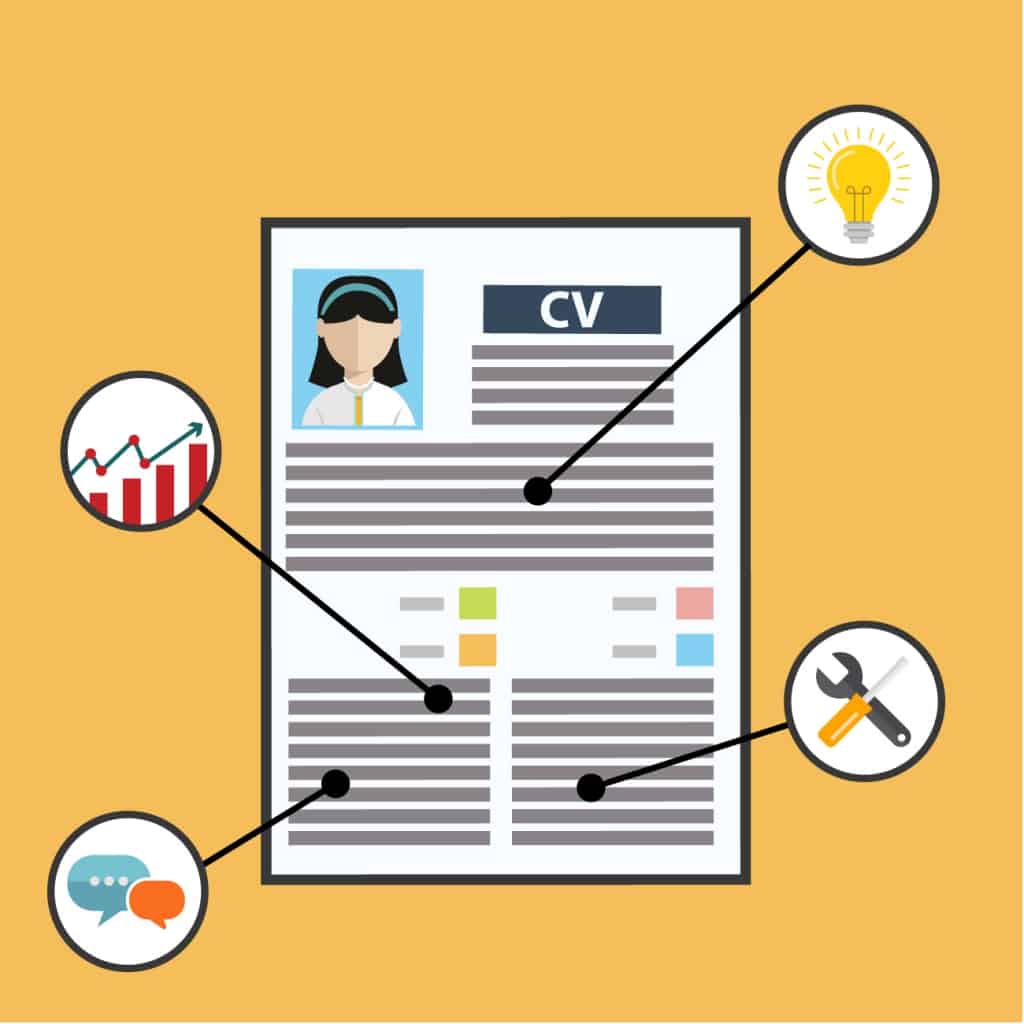
How to Improve Your Analytical Skills?
It is time to practice analytical skills. Here are selective tips from experts to help individuals improve their analytical skills.
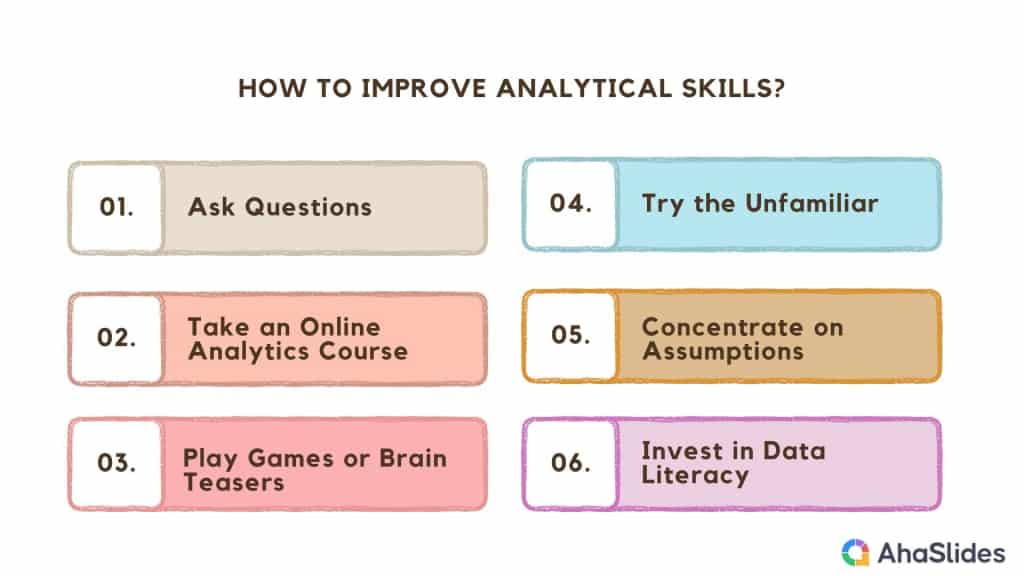
Tips #1: Ask Questions
As Albert Einstein once said, 'The important thing is not to stop questioning. Curiosity has its own reason for existing. ' Thus, questioning is the first technique to use if you want to improve your analytical skills. It's a practice that encourages critical thinking, curiosity, and a deeper understanding of the world around us.
“The important thing is not to stop questioning. Curiosity has its own reason for existence.”
— Albert Einstein
You might also like: How to Ask Questions – Best Beginner Guide in 2025!
Tips #2: Take an Online Analytics Course
Self-Paced Learning learning is important. You can attend online courses from reliable learning platforms to learn more useful knowledge about big data, analytics, and cognitive skills. This flexibility of online courses allows you to balance learning with your work or other commitments.
Tips #3: Play Games or Brain Teasers
Engaging in games, puzzles, and brain teasers can be a fun way to sharpen your analytical thinking. Games like chess, Sudoku, and crossword puzzles require strategic thinking and problem-solving, which are essential for analytical skills. What's more? Creating your own quiz and asking others to join can make a stronger impact on improving your analytical skills.
You might also like: 60 Awesome Ideas On Brain Teasers For Adults | 2025 Updates
Tips #4: Try the Unfamiliar
Stepping out of your comfort zone, and trying new experiences, something you never thought of before sounds like a great method to master analytical skills. It helps you stay away from stereotypes, broadens your perspective, and encourages you to approach problems with fresh insights. Your example of using your non-dominant hand for daily activities is a perfect illustration of this concept.
Tips #5: Concentrate on Assumptions
Critical thinking often involves questioning assumptions. When faced with a problem, examine the assumptions you're making about the situation. Are they valid? Are there alternative perspectives to consider?
Tips #6: Invest in Data Literacy
In today's data-driven world, data literacy is a valuable skill for enhancing analytical abilities. Invest in learning how to collect, analyze, and interpret data effectively. Keep up with developments in data analytics and technology to stay competitive in your career.
Key Takeaways
Practice makes perfect! Start to master analytical skills from daily routine. Whenever you are going to make a decision, try to follow our tips to have the most desired outcomes.
Want more inspiration? Creating your own quiz with AahSlides! Host a brainstorming session to foster creativity! Engage your audience in the most innovative way!
Frequently Asked Questions
How do I describe my analytical skills?
It is best if you can prove analytical-related experience. For instance, you could talk about a time when you used data analysis to solve a problem or a time when you used critical thinking to come up with a new solution.
How do you show analytical skills on a CV?
When you are describing your analytical skills, use numbers and statistics to support your claims. This will make your CV more credible. Mention certificates of analytical relevant courses you attended in the past.
What are analytical skills in management?
Analytical skills are essential for managers in all industries. In terms of management, basic analytical skills are highly appreciated such as Problem-solving skills, Decision-making skills, Communication skills, Data analysis skills, and Critical thinking skills.
Ref: Forbes | Harvard Business School | BLS








